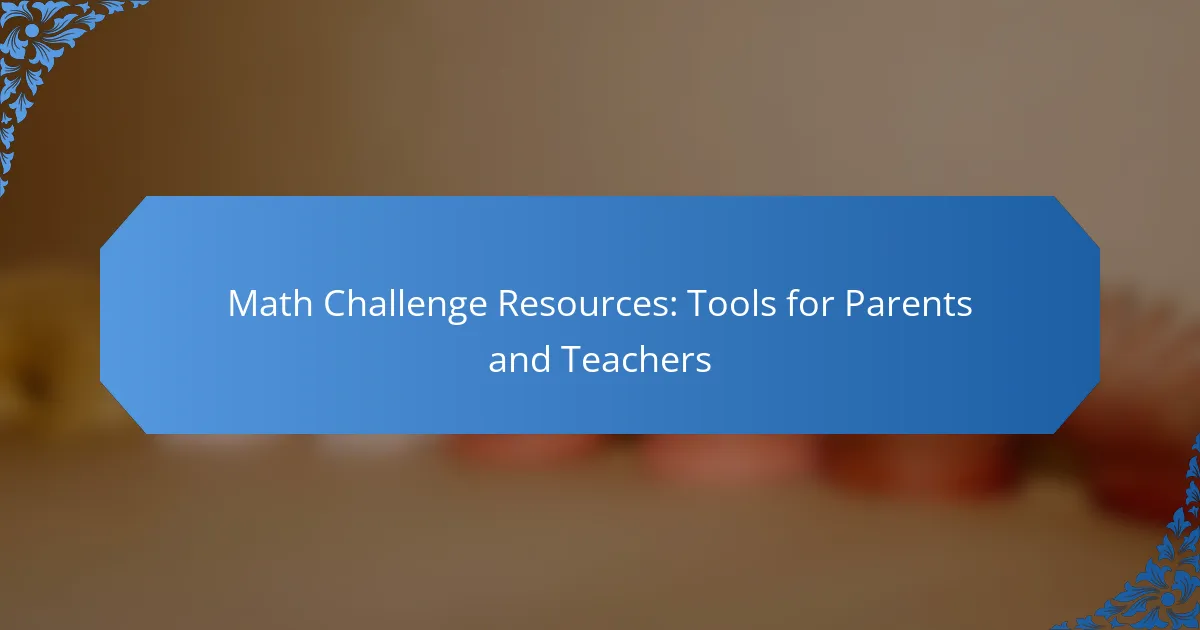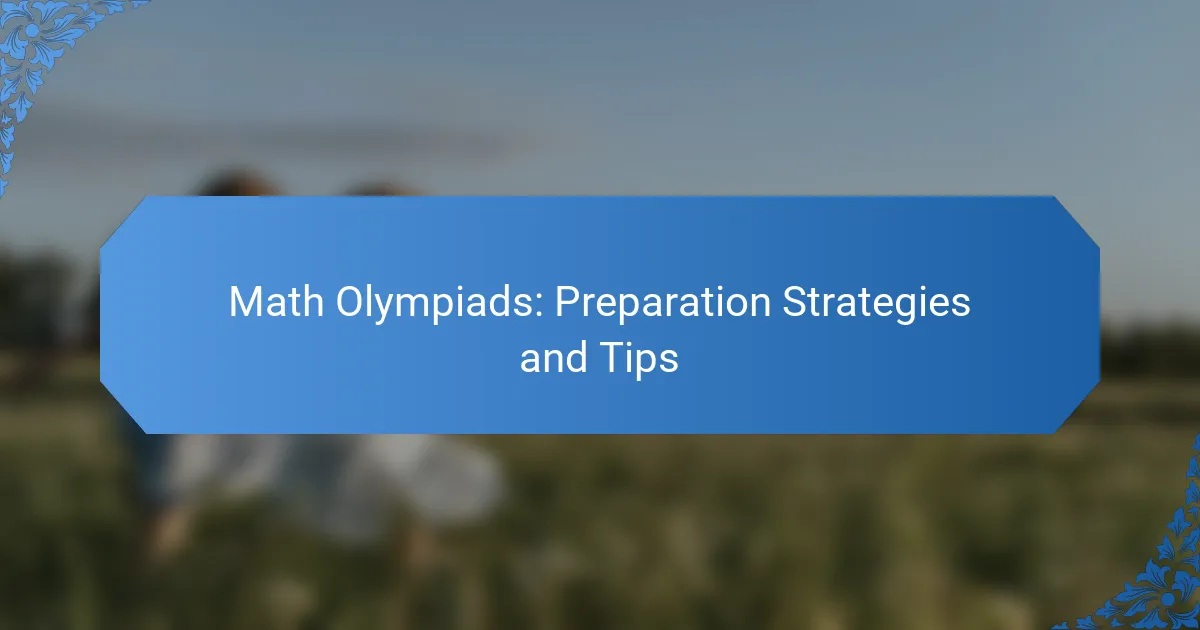Math challenge resources are invaluable for both parents and teachers seeking to enhance students’ problem-solving abilities. By utilizing engaging online platforms and activities, these tools make math practice enjoyable while promoting critical thinking and a deeper understanding of mathematical concepts. Integrating these math competitions and challenges into learning environments can significantly boost students’ interest and performance in math.
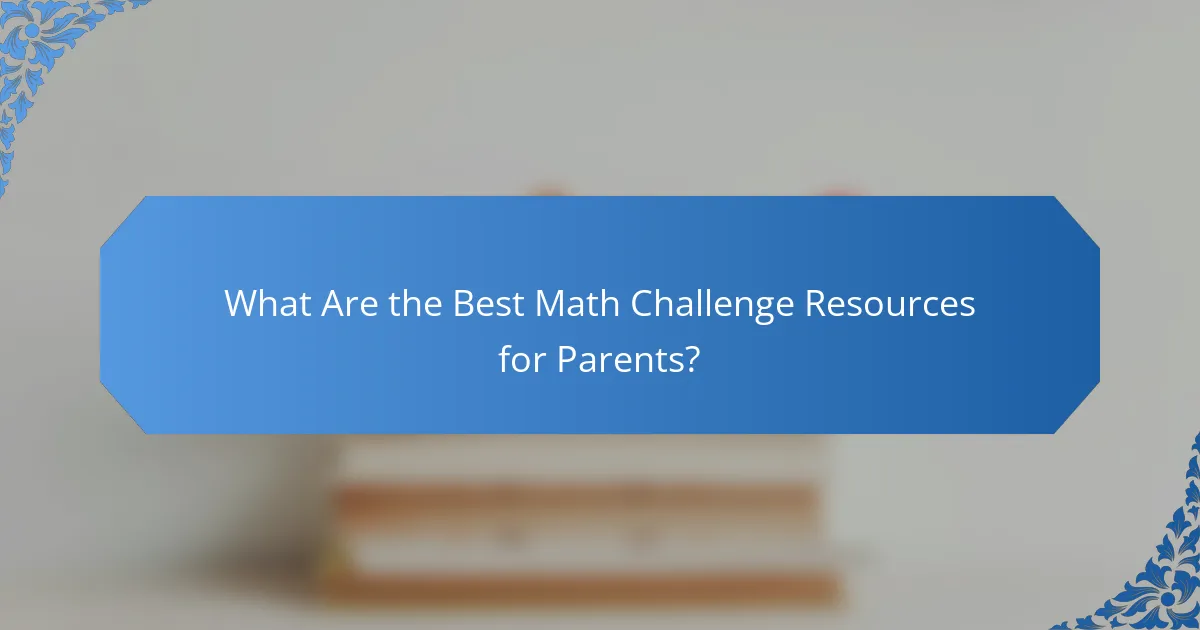
What Are the Best Math Challenge Resources for Parents?
Parents looking for effective math challenge resources can benefit from various online platforms that enhance their children’s problem-solving skills. These tools often combine engaging activities with educational content, making math practice enjoyable and effective.
IXL Math Practice
IXL Math Practice offers a comprehensive online platform that covers a wide range of math topics from preschool to high school levels. Parents can track their child’s progress through personalized learning paths and skill assessments, ensuring that they focus on areas needing improvement.
One key feature is the immediate feedback provided after each question, helping students understand their mistakes in real time. Subscription plans are available, typically costing around $20 per month, which can be a worthwhile investment for ongoing math practice.
Prodigy Math Game
Prodigy Math Game is an interactive platform that turns math practice into a fun, role-playing adventure. Children can engage in math battles while solving problems aligned with their grade level, making it appealing for young learners.
This resource is free to use, with optional premium features available for parents who want additional content. It’s particularly effective for motivating children who may otherwise be reluctant to engage with math.
Mathletics Platform
Mathletics is a well-rounded platform that combines interactive activities with a structured curriculum, catering to students from kindergarten through high school. It offers a variety of challenges and games that adapt to a child’s skill level, promoting mastery of concepts.
Parents can monitor progress through detailed reports, which highlight strengths and areas for improvement. Subscription costs are typically around $15 per month, making it a reasonable option for families committed to enhancing their child’s math skills.
Coolmath Games
Coolmath Games provides a collection of math-based games that focus on logic and problem-solving rather than traditional computation. This platform is particularly useful for developing critical thinking skills in a fun and engaging way.
While many games are free, some premium games require a small fee. It’s a great option for parents looking to supplement their child’s learning with enjoyable activities that still reinforce mathematical concepts.
Khan Academy Math Challenges
Khan Academy offers a wealth of resources, including math challenges that cater to various age groups and skill levels. The platform is entirely free and provides instructional videos, practice exercises, and personalized learning dashboards.
Parents can encourage their children to tackle math challenges that align with their school curriculum, helping reinforce classroom learning. The structured approach helps students build confidence and competence in math over time.
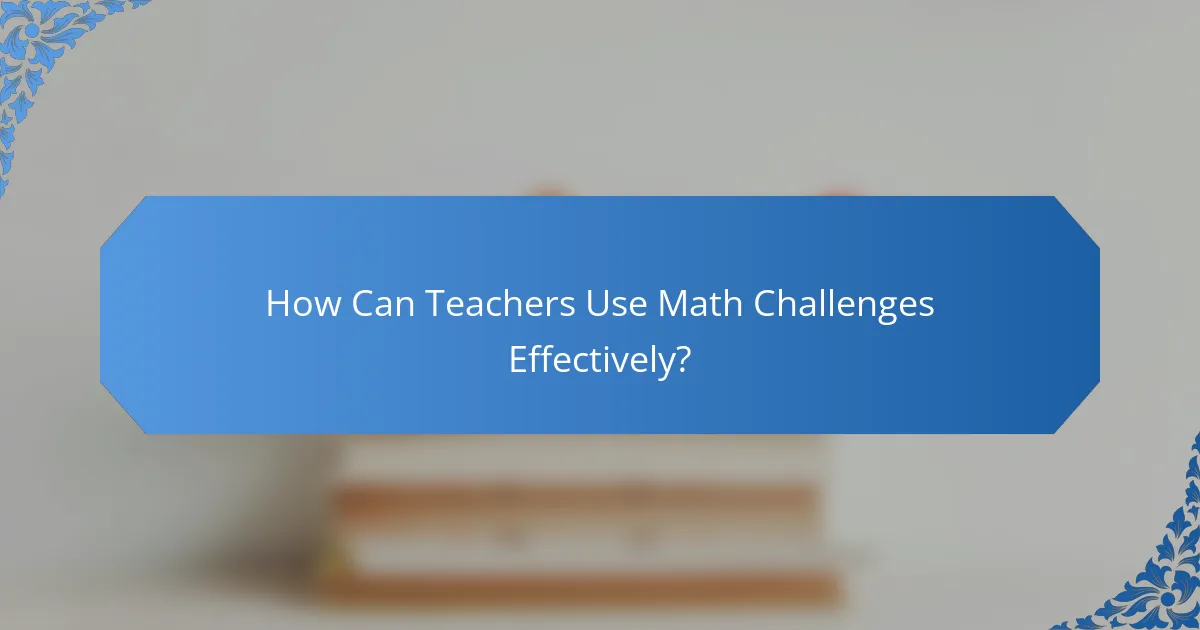
How Can Teachers Use Math Challenges Effectively?
Teachers can use math challenges to enhance critical thinking and problem-solving skills among students. By integrating these challenges into lessons, educators can foster a more engaging and interactive learning environment.
Incorporating Challenges in Curriculum
Integrating math challenges into the curriculum can be done by aligning them with existing learning objectives. For instance, teachers can introduce challenges that relate to current topics, such as fractions or geometry, to reinforce concepts while promoting deeper understanding.
Consider using a mix of individual and group challenges to cater to different learning styles. Group challenges encourage collaboration, while individual tasks can help assess personal understanding.
Using Online Platforms for Engagement
Online platforms can significantly enhance student engagement with math challenges. Websites and apps that offer interactive problems and gamified experiences can motivate students to participate actively. Popular platforms include Khan Academy and Prodigy Math, which provide tailored challenges based on student performance.
Teachers should select platforms that allow for tracking progress and providing instant feedback. This helps students understand their strengths and areas for improvement, making the learning process more effective.
Assessment Tools for Math Challenges
Effective assessment tools are essential for evaluating student performance in math challenges. Teachers can use rubrics that outline specific criteria, such as problem-solving strategies and accuracy, to provide structured feedback.
Additionally, formative assessments like quizzes or reflective journals can help gauge student understanding over time. Incorporating peer assessments can also encourage students to engage critically with each other’s work.

What Are the Benefits of Math Challenges?
Math challenges provide significant benefits by enhancing critical thinking and fostering a deeper understanding of mathematical concepts. They encourage students to engage with math in a fun and stimulating way, which can lead to improved academic performance and a greater interest in the subject.
Enhancing Problem-Solving Skills
Math challenges are designed to push students to think critically and develop their problem-solving abilities. By tackling complex problems, students learn to analyze situations, identify patterns, and apply various strategies to find solutions. This skill set is valuable not only in mathematics but also in everyday life.
For instance, a challenge might present a real-world scenario requiring students to calculate the most efficient route for delivery trucks. Such tasks help students practice logical reasoning and decision-making under pressure.
Boosting Student Engagement
Engaging students in math through challenges can significantly increase their interest and motivation. When students participate in competitive or collaborative math activities, they often feel a sense of accomplishment and excitement. This engagement can lead to a more positive attitude towards math overall.
Teachers can enhance this engagement by incorporating gamified elements, such as time limits or rewards for completing challenges. These strategies can make math more appealing and relatable, especially for younger students.
Encouraging Collaborative Learning
Math challenges often promote teamwork, allowing students to collaborate and share different approaches to solving problems. Working in groups helps students learn from one another, fostering a sense of community and improving communication skills.
For effective collaborative learning, teachers can assign group challenges where students must work together to solve a problem. This not only builds social skills but also encourages diverse thinking, as each student may bring unique insights and methods to the table.

What Criteria Should Parents Consider When Choosing Resources?
Parents should evaluate resources based on age appropriateness, alignment with learning objectives, and cost accessibility. These criteria ensure that the materials effectively support their child’s mathematical development and fit within their budget.
Age Appropriateness
When selecting math resources, consider the age and developmental stage of the child. Materials should match the child’s cognitive abilities and interests to maintain engagement and promote effective learning.
For younger children, look for resources that incorporate play and hands-on activities, while older students may benefit from more structured approaches, such as worksheets or online platforms. Always check the recommended age range provided by the resource.
Learning Objectives Alignment
Ensure that the resources align with the educational standards and learning objectives relevant to your child’s curriculum. This alignment helps reinforce what they are learning in school and supports their overall academic progress.
Review the content to see if it covers key mathematical concepts appropriate for the child’s grade level. For instance, resources for elementary students should focus on basic arithmetic, while middle school materials might delve into geometry and algebra.
Cost and Accessibility
Evaluate the cost of resources and their accessibility to ensure they fit within your budget. Many high-quality materials are available for free or at a low cost, especially online.
Consider whether the resources require additional purchases, such as subscriptions or physical materials. Look for options that provide trial periods or free samples to assess their effectiveness before committing financially.
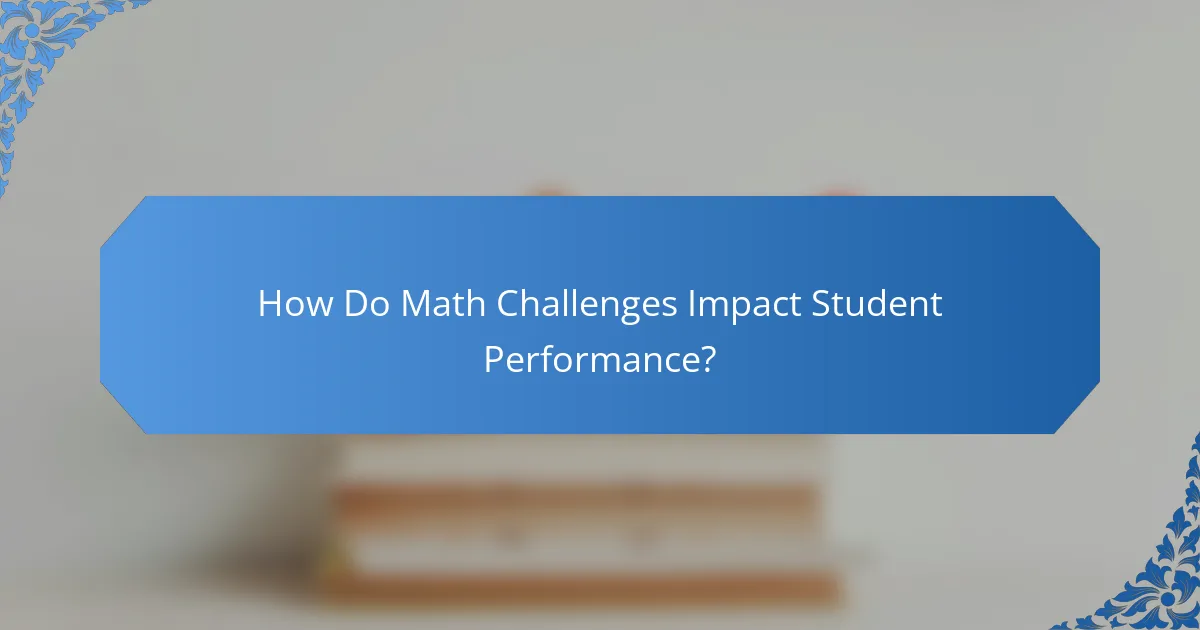
How Do Math Challenges Impact Student Performance?
Math challenges significantly enhance student performance by fostering critical thinking and problem-solving skills. Engaging in these challenges encourages students to apply mathematical concepts in practical scenarios, leading to deeper understanding and improved academic outcomes.
Improved Test Scores
Participating in math challenges often correlates with higher test scores. Students who regularly engage in these activities tend to develop better analytical skills and a stronger grasp of mathematical principles, which can translate into improved performance on standardized tests.
For example, students who participate in math competitions may see their scores increase by a range of 10-20% on math assessments compared to their peers who do not engage in such activities. This improvement is attributed to the rigorous practice and exposure to diverse problem types that challenges provide.
Increased Confidence in Math
Math challenges can significantly boost students’ confidence in their mathematical abilities. As they tackle complex problems and succeed, they build a sense of accomplishment that encourages further exploration of math topics.
Students often report feeling more prepared for classroom discussions and tests after participating in math challenges. This newfound confidence can lead to a more positive attitude towards math, reducing anxiety and promoting a willingness to tackle difficult concepts.
